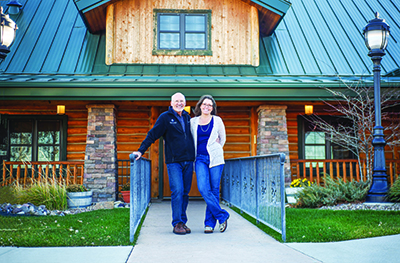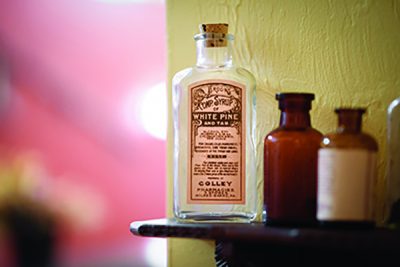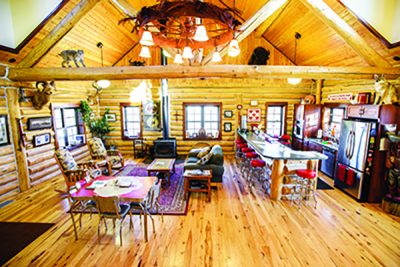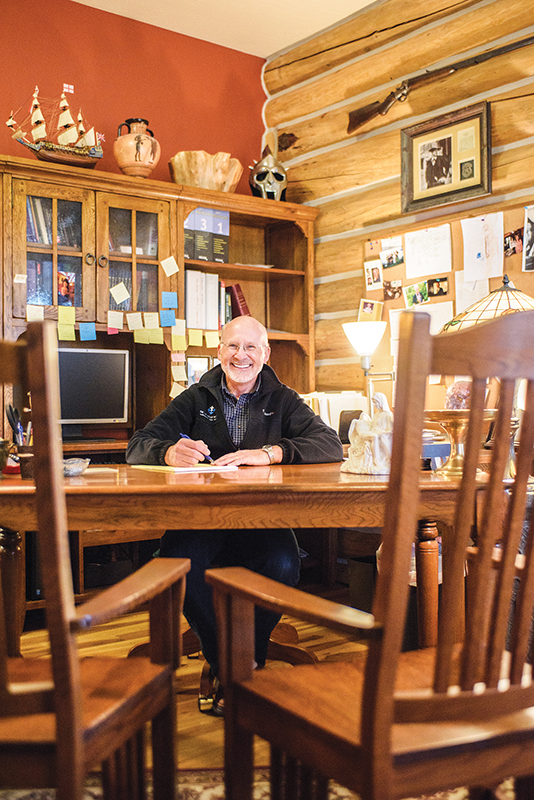Dr. Dan Walker gives a lot of thought to what tomorrow and the practice of medicine may bring
Written by Polly Kolstad • Photography by Jesse Martinez

A visit to Dr. Dan Walker’s office is a step into a pioneer log cabin custom built to receive patients much like the building that housed an earlier generation of Walker medicos.
The first fact he mentions is economics. It is hard to keep staff, and the changing environment of health insurance.
Decades into a successful career, he laments: “I may have to close my door by next spring.”
The Walker family has a tradition in medicine that goes way back. Both grandmothers and grandfathers were physicians.
“My grandma was divorced with two children. She wanted to become a nurse. She went to medical school.
She married her pathology professor, Dr. Thomas Walker. In 1918, he hopped a train and got off in Great Falls, and stopped in the first doctor’s office he found. He tried Columbus Hospital which needed a pathologist so both he and grandma (a radiologist) came. They opened an x-ray and pathology office in the Medical Arts Building and were well known in the community.”
Grandma’s story about the Depression has not been forgotten. They had their lab equipment in the basement filled with old glass plates and trays. Dora Elizabeth Walker was Montana’s first radiologist. By 1937, she was the only independent female radiologist in the United States. She was the first woman president of the Cascade County Medical Association. She later sold her equipment to Dr. Petkevich who carried on her practice.
In 1918, Dr. Dan Walker’s father, Thomas, was born in Denver. Thereafter, the family moved to Great Falls. Thomas was quite an athlete. He played football at Great Falls High School, and went on to study and play football for Stanford University. He entered medical school, graduated early, and served in World War II.
“He was proud and loyal and had a deferment but felt he couldn’t live with himself, so he went to the South Pacific and served.”
After WW11, he completed his residency at Stanford, came to Great Falls and started his practice in 1948. His dad practiced for years retiring in 1983. Dr. Dan Walker practiced with his dad for about three years (1981) and then went two years for a cardiology fellowship. He has been in the field of cardiology medicine since then.
“I tried to retire at the age of forty-six, he says, “but came back after awakening at two a.m. one morning hearing a voice say ‘I didn’t give you an opportunity in medicine to cut firewood and stone.’”
That did it. He was lulled into the history and place he always wanted. The line of family longevity in the eighteenth century goes back to a Kentuckian, Dr. Thomas Walker, who took care of Thomas Jefferson in his eight by twelve foot log cabin. Six years ago, building on that prospective legacy, Dan moved into a unique log cabin with the assistance of his wife, Nancy, who works with him in the office.
 Today, his “homey” office is filled with artifacts, animals, and antiquities; a collection of things people bring in.
Today, his “homey” office is filled with artifacts, animals, and antiquities; a collection of things people bring in.
“We have achieved what we wanted to achieve. People come into our home (cabin). I spend time with patients, anywhere from half an hour to one hour/twenty minutes. I appreciate the time I have to spend with them. It’s the most fun I have had in my medical career.”
From Dr. Dan Walker’s point of view, there is a bigger story which is happening nationwide. Early on, the practice of medicine included penicillin, sulfa drugs, digitalis, and insulin. “When dad practiced that was it.”
Elaborating, he explains the enduring treatment of cancer, hip and knee replacements, heart, and cataracts; a number of things we take for granted. “With technology, he says, “we have paid the price.”
“We are moving toward a situation where a person sees another doctor or nurse. Today, a patient is taken care of by a provider, nurse practitioner, etc. That changes the dynamics between the doctor and the patient.
Three people you should know well in life: doctor, priest, bartender. Today we have lost the relationship, that is crucial for caring for a person.”
Dr. Dan Walker notes the change in medical care and likens it to what Charlie Russell saw on the passing of the frontier; changes in medical care that won’t come back. He cites a recent article in the New England Medical Journal concerning medical electronic records: “For every one hour a doctor sees a patient, he spends two hours of record keeping. He pauses and recalls his father’s practice and keeping medical records.”
“Dad would write a note for an office visit for $7.00. That was it.”
Well into his practice, at the age of forty, Dr. Dan Walker had a nurse, a receptionist, a physical therapist, and an accountant. Today, he has an echotech, nurse, chart person, transcriptionist, receptionist, biller, and a part time lawyer. It takes eight people to run his practice. He needs to share the overhead. Admittedly, it is hard for him to tell a patient he might not be here in six months.
“Patients are my family; it is hard to say “good bye” to people and wonder how they will be taken care of.”
Dr. Dan Walker has 1500 patients and doesn’t consider that a huge patient load. He doesn’t see patients in the hospital. He sees patients in his office where he can spend more time with them. His day begins at 4:00 a.m. He exercises, studies from teaching seminars, and gets to the office by 7:00 a.m. He starts a fire in the fireplace, makes coffee, reviews charts, and reads for the day. He is usually there until 7:30 pm. In the summer, he takes Fridays off. Now he longs to go home, mow the lawn. He is tired of eating dinner at 9:30 pm.
“My office is like home. It’s not hard to spend the time here,” but he bemoans the fact that he doesn’t have the energy he once had.
Yet, there is something to be said for experience. “I think I am a better doctor now than I was.”

Both grandmothers and grandfathers of Dr. Dan Walker were Montana doctors. The homey interior of the doctor’s office complete with kitchen for baking heart healthy patient treats
Has he lived through the Golden Age of Medicine?
“Yes and no. If the Golden Age defines the things we can do, the treatments that are available, then we are just getting into the tip of the iceberg. There will be diseases that will be things of the past. From WWII when anasthesia was introduced, operations became safe. The simple washing of hands, defined public measures. People no longer die from polio. We have eradicated a lot of diseases already. But, the Golden Age of Medicine comes with a price. The loss of relationships with doctors. We have turned that into providers.”
At 7:00 a.m. sitting with a cup of tea, and looking into his waiting room, he ponders.
“This has been so much fun. How can I leave this?”
“It is such a privilege to be a part of people’s lives. It is not a right that comes with your degree.
We are pilgrims on a journey. Our job is to help people along the way. That should be our job as doctors in life.”

